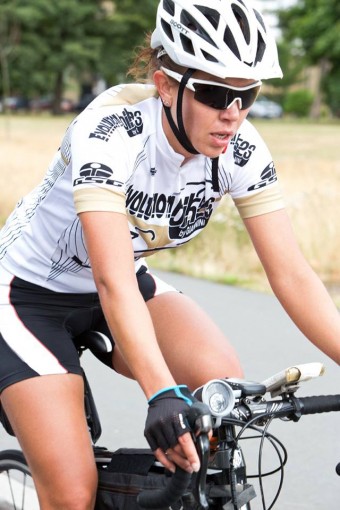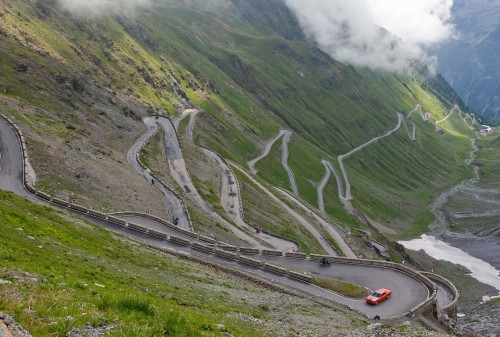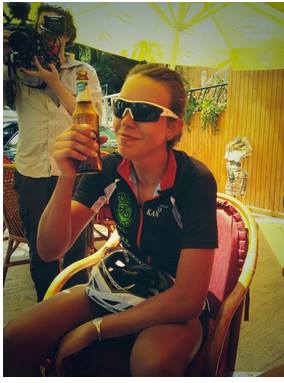The Transcontinental Race
http://iowabookgal.com/author/admin/page/2/ 
It was about the time the saddle sores started bleeding, the dull ache in my knees got sharper, the sun burned some crazy degrees too many and headwinds slammed into me at 60 kmph, that I began to think participating in the Transcontinental Race had been a really bad idea.
When Mike Hall originally told me about the toughest unsupported race across Europe, the first ever of its kind, I was pretty sure I could take it on. I mean, I’d cycled the world, what’s a continent? For being rather cynical, or “realistic”, by nature, I am pathetically optimistic when it comes to challenges. And it would be a challenge, that much I knew, or I wouldn’t have signed up. I intended to push myself and discover new potential or limitations. I’d only been cycling for two years and this would be my first race ever. I had no idea what I was up against, only that, being the only woman in the race, it involved contending with great quantities of testosterone.
After the world cycle, I couldn’t find the will power to get on a bike for a good four months. But as the date for the race was quickly approaching, I could no longer put off training. It was a needed incentive to get back in the saddle and I was surprised how quickly my muscles picked up where they’d left off. I’d lost my cycling form, but after just two months, I was pedaling 200 km days without breaking a sweat. Knowing I’d have to cross the Alps, I did a lot of hill training as well. There’s nothing like a series of mountains to slow down your time in a race. In hindsight, I did not train even close to enough.
But don’t get me started on hindsight. In hindsight, it was too soon to do something this big and this tough. Physically, I was a lot better off than mentally. By day five, my brain was fighting me. The Alps began and those long, windswept mountain ranges started to wear down my resolve. I woke up 3:30am and headed up the Fluela Pass, a 15 km climb in the wind, rain and darkness. By the time I came down, my head was pounding and I felt cold and feverish. I swallowed an aspirin and carried on. The rain did not let up until I entered Italy, when the sun broke through and I was prematurely thanking the weather gods there’d be sunny skies for the climb up the Stelvio. I stopped 4 km up the pass for a good espresso and a couple cornetti with nutella. Feeling much better and ready to take on the mountain, I clipped in and carried on up, passing other cyclists lagging much heavier gear, glad I’d packed minimal weight. I had just one other shirt, socks, a pair of boxers, bed roll and the rain jacket I was wearing.
About 10 km up, the sky clouded over and rain began to fall. 12 km, the wind turned ferocious. The higher I climbed, the worse the elements grew; wetter, colder, windier. Wind so strong, it nearly knocked me over. The cold and wet soaked into muscle and bone. At times like this, no amount of mental distraction can take your mind off the very real and present misery. The race crew came down from the checkpoint at the top to watch me climb the last kilometers, Mike driving, the camera guy filming, at whom a string of unladylike expletives were directed.
Twenty four kilometers that felt like forty four later, and I finally reached the top soaked and shivering, but gratified the worst was over. Four of the other cyclists came in after and joined me stuffing down large quantities of pasta and pizza. The wind and rain went on lashing down as we sat in the warm restaurant hoping both would calm enough for the descent. When neither appeared to have any intention of letting up, there was only one thing to do. Jam an entire newspaper inside the front of my shirt and gloves, knock back a double shot of whisky, and head into the elements.
The descent was harrowing. One of many times that having a good imagination does not serve. Images went through my head of what could happen should my brakes fail or my wheels slip or a powerful gust push me off and over the mountain. I went down slowly in fits and starts. It took an hour. By the time I reached bottom, my hands were so numb I couldn’t tell if they were pressing the brakes or not.
Then the road was flat, the rain stopped and I had a marvellous tail wind. The worst was over and my optimism came out, all shiny and bright, with the sun. The tail wind pushed me across Italy and I had the best day yet. 330 kilometers smashed, 100 of which were a long detour. Caught up in the pleasure of the long flat cycle path along the river, I failed to turn left towards Treviso and went straight down to Verona. Lost time and kilometers I would have to make up.
The night before leaving, my sister, Kristina, said to me, “remember Farlap”. Farlap was a film we used to watch as kids about a racehorse who would start in the back, conserving his energy until the final laps, when he would suddenly push forward, galloping past the other horses and ending in front. It was time to gallop. My body had completely acclimatized to the long hours on the bike, my sores had healed, the pain in my knees lessened as my muscles grew stronger. The race was on.
I started pedaling between 320 – 350 km a day, making good time through Slovenia and Croatia and crossing into Serbia. I thought my bum had pretty well hardened by this point, the sores having long turned to callous. That was until I became acquainted with Serbian roads. Apart from the highway, there is no good, direct road across the country and navigating through the labyrinth of side roads and villages kills time, speed and the will to cycle.
About this point, I hit a wall mentally. Sleep and food deprived, pedaling under 40 degree heat up and down the endless potholed roads, I started to wonder what the hell I was doing anymore. I was not enjoying any of it. What was the point?
Although the Serbian towns and cities were decidedly third world, they all had free wifi. Most likely because nobody have smartphones or ipads, so connections are left open. I was able to check the race status often on the internet. To my surprise, I had moved from around the 15th position to the 10th and was moving in a line with 2 other cyclists. One, Nick, was just ahead of me on the same route. If I was suffering, I imagined the others were too.
I decided the best way to get past the wall was to pedal through it. Once I got into Bulgaria everything got better. I started racing the cyclist ahead of me, and managed to pass Nick on the road. If you lose your incentive, find a new one. Keep ahead of the guy behind. With this plan in mind, I pedaled 400 kilometers, stopping only to grab something fast from service stations enroute. By the time I stopped to eat something just 170 km from Istanbul, I was so knackered I fell asleep in the restaurant. When I woke again a few hours later, Nick, who had kept cycling, had long passed me by. He deserved to have this one, arriving a few hours ahead of me in the 8th place. I was coming in 9th. Out of the 31 cyclists at the starting line, 9 had already dropped out for one reason or another. I could well understand why. Apart from health or physical issues, the fatigue starts to wear you down mentally. Time and reality begin to warp in strange ways.
Istanbul was so close. The last push and last hurdles included an adrenaline-rousing dog attack, a puncture changed on the motorway with giant trucks speeding past, and finally, a powerful headwind. The final 60 km stretch of motorway into the city felt endless, like the Istanbul skyline was a moving backdrop going round and round infinitely.
There are few adequate adjectives to describe how it feels to roll up to a finish line after a race like this one. A group of the guys who had come in before me were waiting there, including Kristof Allegaert, winner of the race, two wheel terminator and a really funny guy off-bike. Richard Dunnett, no.2 winner and another incredible cyclist, handed me a cold beer. There’s nothing like drinking a beer or ten that you’ve earned. But then there’s nothing like sleeping in a comfy bed after a couple weeks of sleep deprivation and napping behind bushes. There’s nothing like sitting in a chair under the shade doing nothing for hours after you’ve pedaled 16 – 18 hours every day under the baking sun. There’s nothing like a long hot shower after the accumulated dust and grime of the road. There’s nothing like eating in a good restaurant after filling your belly with cold packaged sandwiches from service stations for a couple weeks. There’s nothing better than all the ordinary everyday things we take for granted. Adventure and limit-pushing aside, a race like this one is sure to reawaken one’s appreciation for the little things in life that it’s so easy to lose when you’re caught up inside it.


Alessandro
August 23, 2013 @ 12:48
Fantastica… ti ammiro molto !!!
Stephen
August 23, 2013 @ 15:57
I wonder why only 30 people signed up for the race 🙂 Great achievement and look forward to following your next adventure.
Sabine
August 23, 2013 @ 16:13
you always were adventurous and daring!
Amazing what you went through! and you expressed it so well! fabulous article! (I hope your knees are ok now!)
Gursel Akay
August 24, 2013 @ 01:58
What an amazing person!!
Peppe Blow
August 24, 2013 @ 08:49
Sei mitica 😉 e anche molto carina.
Lee
September 11, 2014 @ 05:58
Amazing!!!